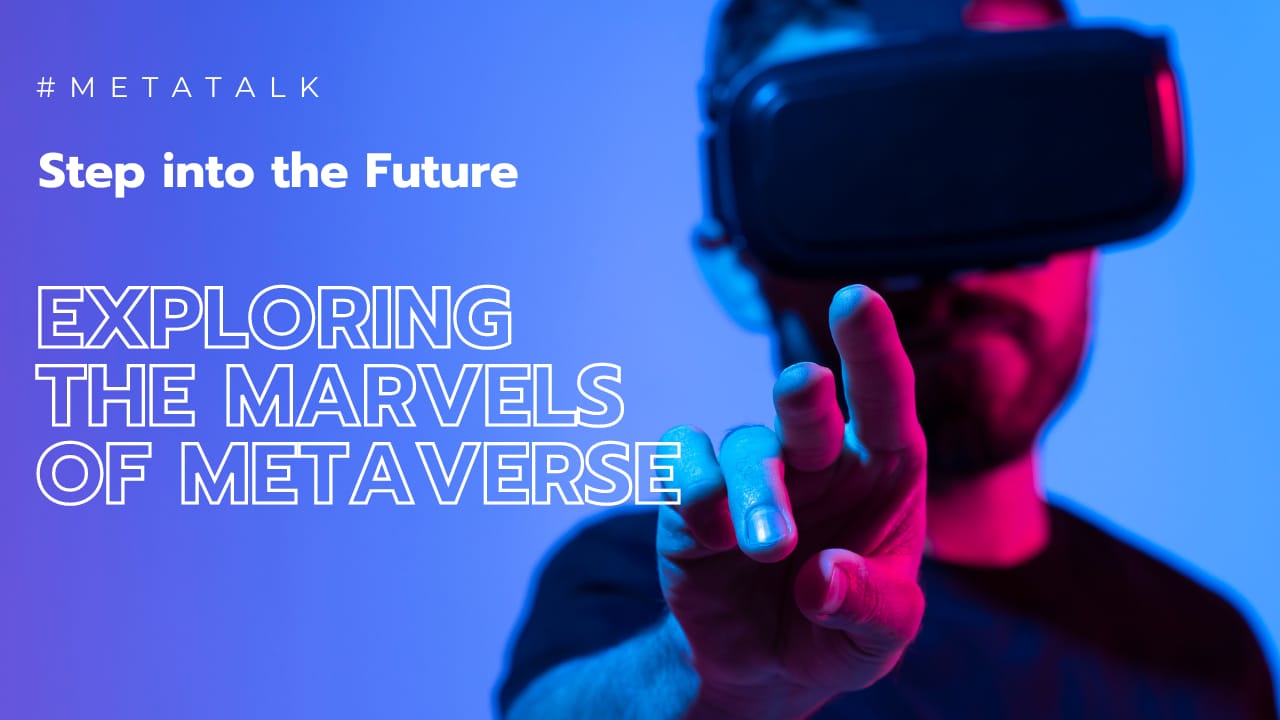- admin
- Marketing, meta, meta marketing, metaverse
- 0 Comments
- 4355 Views
Introduction
Welcome to the future of technology and virtual reality! The Metaverse is an exciting concept that has been gaining tremendous popularity in recent years, promising to revolutionise the way we interact with digital spaces. In this article, we will delve deep into the wonders of the Metaverse, its potential applications, and how it is poised to change the landscape of our daily lives. So, fasten your seatbelts as we embark on this journey into the virtual realm!
What is the Metaverse?
The Metaverse is a vast interconnected virtual universe, where users can seamlessly interact with one another and the digital environment. Think of it as a collective, immersive, and shared online space that merges virtual reality (VR), augmented reality (AR), and the internet. In the Metaverse, users can traverse various virtual worlds, participate in activities, socialize, conduct business, and even create content.
The Evolution of the Metaverse
The concept of the Metaverse can be traced back to science fiction, where writers envisioned interconnected virtual realities. However, thanks to technological advancements, what once seemed like mere imagination is now becoming a tangible reality. The journey of the Metaverse began with the development of online multiplayer games and social platforms, but it has now evolved into a much grander and interconnected ecosystem.
Key Components of the Metaverse
1. Virtual Worlds
In the Metaverse, numerous virtual worlds exist, each with its unique design, rules, and inhabitants. These worlds can be anything from realistic simulations of cities to fantastical realms filled with magic and mythical creatures. Users can access these worlds through compatible devices and explore them in immersive 3D environments.
2. Avatars
Avatars serve as users’ digital representations within the Metaverse. Users can customise their avatars to reflect their personalities and preferences, allowing for self-expression and a sense of identity in the virtual world.
3. Social Interaction
One of the most compelling aspects of the Metaverse is its emphasis on social interaction. Users can meet friends, family, or even strangers in the virtual realm, just as they would in real life. This fosters a sense of community and connection, transcending geographical barriers.
4. Economy and Commerce
Within the Metaverse, a virtual economy thrives. Users can buy, sell, and trade virtual assets, services, and goods using digital currencies. This opens up new opportunities for businesses to operate and monetize their products in the virtual space.
5. Education and Training
The Metaverse has vast potential in education and training. Virtual classrooms and training simulations offer engaging and immersive learning experiences, making complex subjects more accessible and enjoyable.
Applications of the Metaverse
The Metaverse has numerous applications that span across various industries and domains:
1. Entertainment and Gaming
The gaming industry was one of the earliest adopters of the Metaverse concept. Now, virtual reality games and experiences are taking centre stage, offering gamers unprecedented levels of immersion and interactivity.
2. Social Networking
Imagine attending virtual parties, concerts, or conferences with friends and colleagues from around the world. Social networking in the Metaverse can bridge the gap between distance and create meaningful connections.
3. Virtual Real Estate and Architecture
With virtual real estate gaining traction, architects and developers can design, showcase, and sell their projects in the Metaverse, providing potential buyers with realistic and interactive experiences.
4. Healthcare and Therapy
The Metaverse offers innovative solutions for healthcare, such as telemedicine and virtual therapy sessions, making healthcare more accessible and convenient for patients.
5. Work and Business
Remote work has become a norm in recent times, and the Metaverse can take it to the next level by enabling more immersive virtual office spaces and collaboration tools.
The Future of the Metaverse
The Metaverse is still in its nascent stages, but the potential it holds is awe-inspiring. As technology continues to advance, we can expect the following developments:
1. Seamless Integration
The lines between the physical and virtual worlds will blur as the Metaverse integrates with our everyday lives, enriching experiences and interactions.
2. Enhanced Accessibility
Advancements in hardware and software will make the Metaverse more accessible to a broader audience, democratising its use and benefits.
3. Cross-Platform Interoperability
Users will be able to seamlessly transition between different virtual worlds and applications, regardless of the devices they are using.
Conclusion
The Metaverse presents a thrilling vision of our future, where technology and imagination collide to create boundless possibilities. From entertainment and education to business and socialising, the Metaverse has the potential to reshape our world profoundly.
Frequently Asked Questions (FAQ)
1. What exactly is the Metaverse?
The Metaverse is a vast interconnected virtual universe that combines virtual reality, augmented reality, and the internet. It is a collective online space where users can interact with each other and the digital environment in immersive 3D environments.
2. How is the Metaverse different from virtual reality (VR) and augmented reality (AR)?
While virtual reality immerses users in entirely simulated environments, and augmented reality overlays digital content onto the real world, the Metaverse goes beyond individual experiences. It creates a shared, persistent, and interconnected virtual realm that users can access and interact with using compatible devices.
3. What are virtual worlds in the context of the Metaverse?
Virtual worlds are distinct digital spaces within the Metaverse. Each world has its unique design, rules, and inhabitants, ranging from realistic city simulations to fantasy realms with magical elements.
4. Can I create my own virtual world within the Metaverse?
Yes, many Metaverse platforms allow users to create and customize their virtual worlds. This feature enables content creators, developers, and businesses to design unique environments and experiences for others to explore.
5. How do avatars work in the Metaverse?
Avatars are digital representations of users within the Metaverse. They act as a bridge between the real world and the virtual space, allowing users to interact and socialize with others in the virtual realm.
6. Is the Metaverse limited to gaming and entertainment?
No, the Metaverse has vast potential beyond gaming and entertainment. It has applications in education, social networking, virtual real estate, healthcare, remote work, and more.
7. Can businesses operate in the Metaverse?
Absolutely! The Metaverse offers a virtual economy where businesses can operate and monetize their products and services. Users can buy, sell, and trade virtual assets using digital currencies.
8. How does the Metaverse benefit education and training?
The Metaverse provides a dynamic and immersive learning environment for education and training. Virtual classrooms, simulations, and interactive experiences make learning more engaging and accessible.
9. Is the Metaverse accessible to everyone?
As technology advances, the Metaverse is becoming more accessible to a broader audience. Advancements in hardware and software are making it easier for users to participate and enjoy the virtual experience.
10. What does the future hold for the Metaverse?
The future of the Metaverse is promising. We can expect seamless integration with our daily lives, enhanced accessibility, and cross-platform interoperability. The Metaverse has the potential to reshape how we interact with digital spaces and each other.
11. Can the Metaverse replace physical experiences entirely?
While the Metaverse offers exciting opportunities, it may not entirely replace physical experiences. Instead, it can complement and enhance our real-world interactions, providing new ways to connect and collaborate.
12. Is the Metaverse safe and secure?
Like any digital environment, the Metaverse comes with its unique set of challenges, including privacy and security concerns. Platform developers and users must work together to ensure a safe and secure virtual space.
13. How can businesses leverage the Metaverse for marketing and brand exposure?
Businesses can use the Metaverse to engage with their audience in innovative ways, create immersive brand experiences, and showcase products or services. This can lead to increased brand exposure and customer loyalty.
14. Are there any ethical considerations in the Metaverse?
Yes, as the Metaverse evolves, ethical considerations become increasingly important. Issues related to user privacy, digital ownership, and fair treatment within virtual spaces need to be carefully addressed.
15. How can I get started with the Metaverse?
To enter the Metaverse, you’ll need compatible hardware and access to a Metaverse platform. Many platforms offer tutorials and guides for new users to get started.





